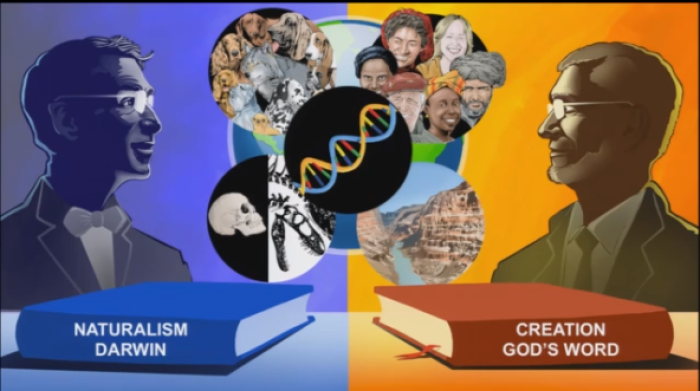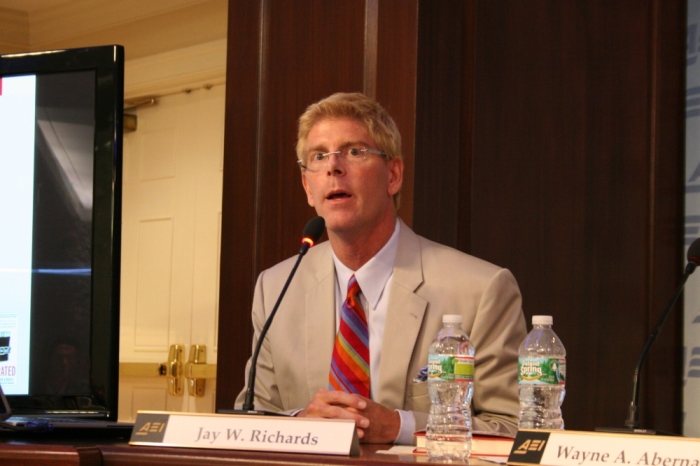Creation Science: 'Old Earth' vs. 'Young Earth'

Viewers of the Ken Ham and Bill Nye debate on Tuesday were left with the impression that Christians, or creationists in particular, all hold to a young earth view. The debate, however, ignored other Christian perspectives, most notably "old earth creationism" of the intelligent design movement – another Christian approach to faith and science.
"Young earth creationists believe that the world was created in six twenty-four hour days and that the earth is no more than 6,000 years old," explained Jay Richards, senior fellow at The Discovery Institute, in an interview with The Christian Post on Thursday. By contrast, "Old earth creationists try to connect the days to long geological time periods." Richards, co-author of The Privileged Planet: How Our Place in the Cosmos Is Designed for Discovery, holds to this latter view.
In the debate, Ken Ham articulated his belief in the young earth view, and attacked Christians who hold to the old earth as inconsistent. He argued against the evidence of radiometric and astrological dating – where scientists study the decay of minerals and the distance of the stars to claim that the universe is at least millions of years old. "I claim there's only one infallible dating method – a witness who was there and who knows everything and who told us – that's the Word of God," Ham, president of Answers in Genesis, said.
Ham acknowledged that old earth creationists can still be Christians "because salvation is conditioned upon faith in Christ, not the age of the earth," but he did insist they were twisting Scripture. Old earth Christians defended their view, arguing that the Bible does not require believers to believe creation took exactly six twenty-four hour days.
Genesis 1 and 2
Young earth creationists point to Genesis 1, where the text seems to argue for a creation lasting six twenty-four hour days. "And there was evening and there was morning, the first day," reads Genesis 1:5. "If this book really is true, it is so specific, it should explain what we see," Ham argued. He claimed that the specific reference to days in Genesis 1 clearly supports the young earth model.
Jack Collins, professor of Old Testament at Covenant Theological Seminary, disagreed. Collins, who also served as Old Testament chair on the translation committee for the English Standard Version of the Bible, argued that Scripture does not support a young earth model, and that those who think so are not reading closely enough.
In Genesis 2, an expansion of the sixth day in Genesis 1, there were no plants on the land until God made it rain. Even though this follows the third day, when God made plants to grow upon the earth, there are no plants. Collins explained that this apparent contradiction is actually a reference to the climate cycle in Mesopotamia. "You have to have the climate cycle to be in effect for at least one year [between days 3 and 6] that tells you that the creation period is longer than a regular week," he said.
Stephen C. Meyer, director of the Discovery Institute's Center for Science and Culture, and a leading voice of the intelligent design movement, also argued against the literal twenty-four hour days. On day four, God creates the sun, the moon, and stars, to be "for signs and for seasons, and for days and years." Because of this, "the yoms in day one, day two, day three, cannot be known as literal 24 hour periods because the sun and moon did not appear until the fourth day," Meyer explained, quoting Collins' work.
Animal Death
"If you believe in millions of years, you've got death and suffering and disease over millions of years," Ham declared. This is inconsistent with Scripture, he argued, because "the Bible makes it very clear death is a result of man's sin."
Collins argued that the Bible does not portray animal death as an evil. "Psalm 104 verse 21 says that lions get their food from God and that is something to be celebrated – the psalm actually celebrates that," the ESV Old Testament chair explained. Because humans were created in the image of God, however, each death is truly a tragedy. "Biblically, the death of humans is the problem, the death of animals is not," Collins said.
Reconciling Faith and Science

Both old earth and young earth creationists aim to reconcile faith and science, but they do so in different ways. Ham, Collins, Richards, and Meyer all agreed that modern science developed from a Christian worldview and works best when scientists assume that the same God created human reason and an ordered natural universe. They disagreed, however, when applying scientific evidence to an understanding of Earth's past.
While Ham argued that the best evidence favors a young earth, he also claimed that a belief about things in the past requires faith – no matter which scientific theory you accept. "We observe things in the present, and we're assuming that has always happened in the past," Ham explained. When it comes to explaining the past, however, "you've got a problem, because you weren't there." In order to be sure, he argued, you need a witness – Scripture.
Collins warned against taking a too rigid view of Scripture's authority in scientific matters. "Very distinguished fathers in the church such as Augustine have cautioned believers against speaking ignorantly with regards to science because that brings the faith into disrepute."
Richards agreed, arguing that "it's not like everything we need to learn about astronomy or chemistry can be learned from the biblical text." He explained that "Christians believe God has two books through which He reveals himself," generally to everyone in the book of nature, and specifically to Christians in the book of Scripture. Both are God's word, and both proclaim the same truth, so reconciling them should not be a problem, Richards claimed.




























